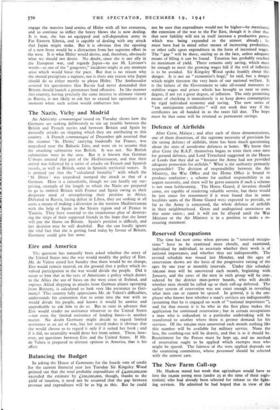Reserved Occupations
The time has now come when persons in " reserved occupa- tions " have to be examined more closely, and examined, individual by individual, to ascertain whether their work is of national importance, and whether they are indispensable. The revised schedule was issued last Monday, and the ages of reservation shown are the basis of the progressive raising of the ages by one year at monthly intervals. Under this schedule too,000 men will be uncovered each month, beginning with January, and the cases of the men in each group will be con-, sidered by the district man-power boards, who will decide whether men should be called up or their call-up deferred. The earlier system of reservation was not exact enough in revealing what men can or cannot be spared. In general, it is the em- ployer who knows best whether a man's services are indispensable (assuming that he is engaged on work of " national importance "), and for that reason it is he who in the first place makes the application for continued reservation ; but in certain occupations a man who is redundant in a particular undertaking will be transferred to another where there is greater demand for his services. Of the too,000 men uncovered each month nothing like this number will be available for military service. None the less, the combing-out will be drastic, and that is as it should be. Recruitment for the Forces must be kept up, and no method of reservation ought to be applied which exempts men who might be spared. The fairness of the tests applied depends on the examining committees, whose personnel should be selected with the utmost care.






















 Previous page
Previous page